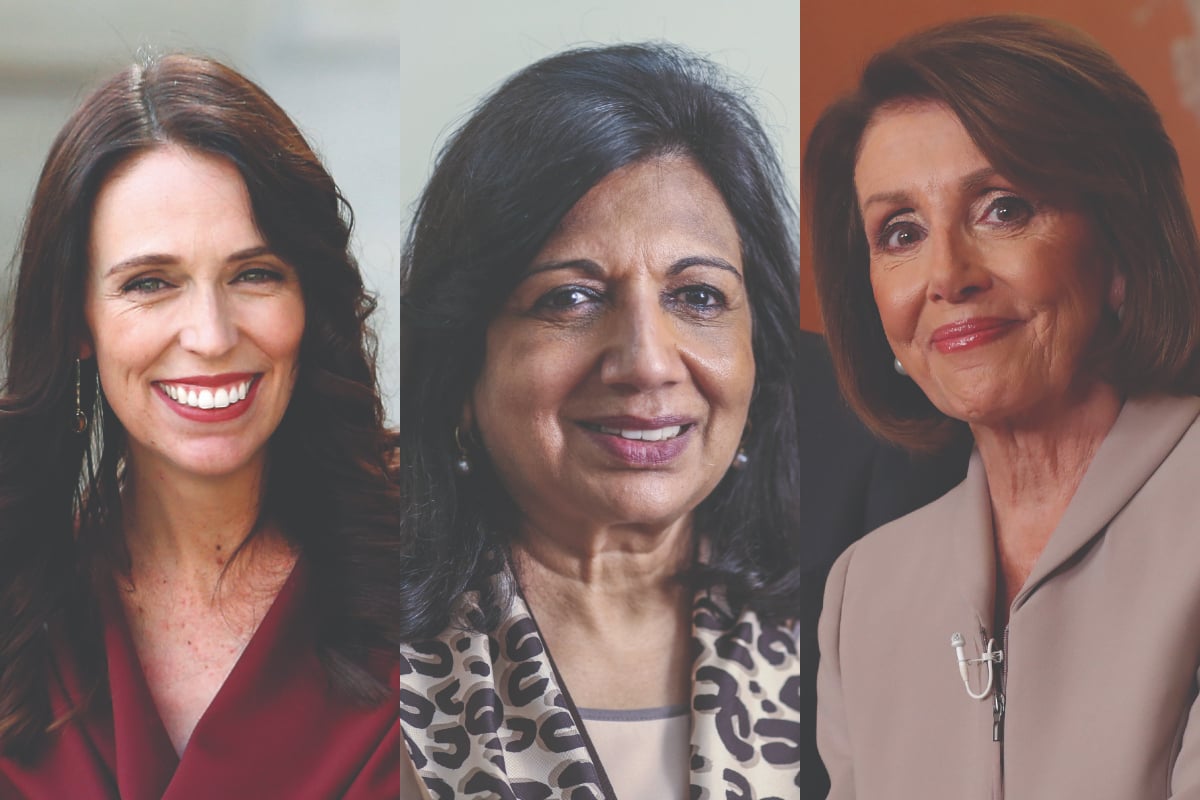In the words of the indomitable Beyoncé, “Who run the world? Girls!”. Well, not quite yet, but if these 16 women have anything to say about it, that reality might not be far off. While not all of these women in leadership have claimed the word ‘feminist’ as their calling card, each one of them fights for gender equality by simply, and powerfully, excelling in their chosen field. In a year when gains for women have stalled or, alarmingly, started to slide backwards, these women have fought harder, reached higher and made space in ‘the room’ for more girls and women to follow.
The Commander: Jacinda Ardern
Prime Minister of New Zealand (2017 –)
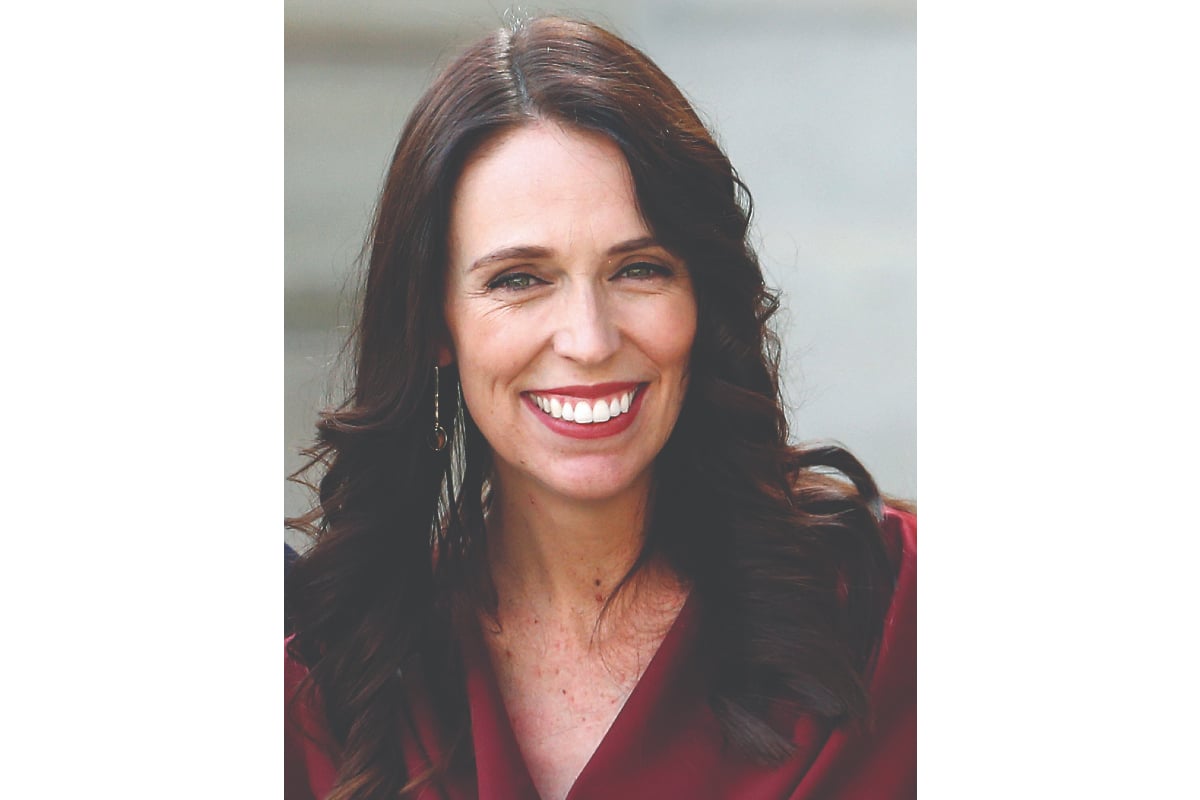
There’s something about Jacinda Ardern. It’s not just that she was the world’s youngest head of state when she was first elected Prime Minister of New Zealand in 2017, or that she is a new mum – youth and maternal instincts are only a small part of her appeal.
Instead, she’s been lauded as a new kind of leader, or ‘the anti-Trump’, for the traits she chooses to exhibit every day – empathy, authenticity, tolerance and kindness. But while she might lead from a place of emotion, she is always decisive and strong in her decision-making. From her quick response of locking down the country at the start of the pandemic, to her steely resolve to not name the perpetrator of the Christchurch Massacre, Ardern never wavers in times of crisis.
She is not without faults, and has many critics at home, especially for her failed attempts at solving housing affordability and child poverty, but her calm and effective leadership meant she was elected for a second term in a landslide victory in October. Ardern knows how to rally her ‘troops’, calm their fears and get the job of the day done – she often thanked her ‘team of five million’ in 2020. She may be a leader only suited for ‘troubled times’, but isn’t that just the type of leader needed in the years ahead?
Most notable achievement: Within a month of the Christchurch Massacre that killed 51 people, Arden led Parliament in banning most assault rifles and semi-automatic weapons across the country.
Queen of Hearts: Celeste Barber
Comedian, Actor and Writer
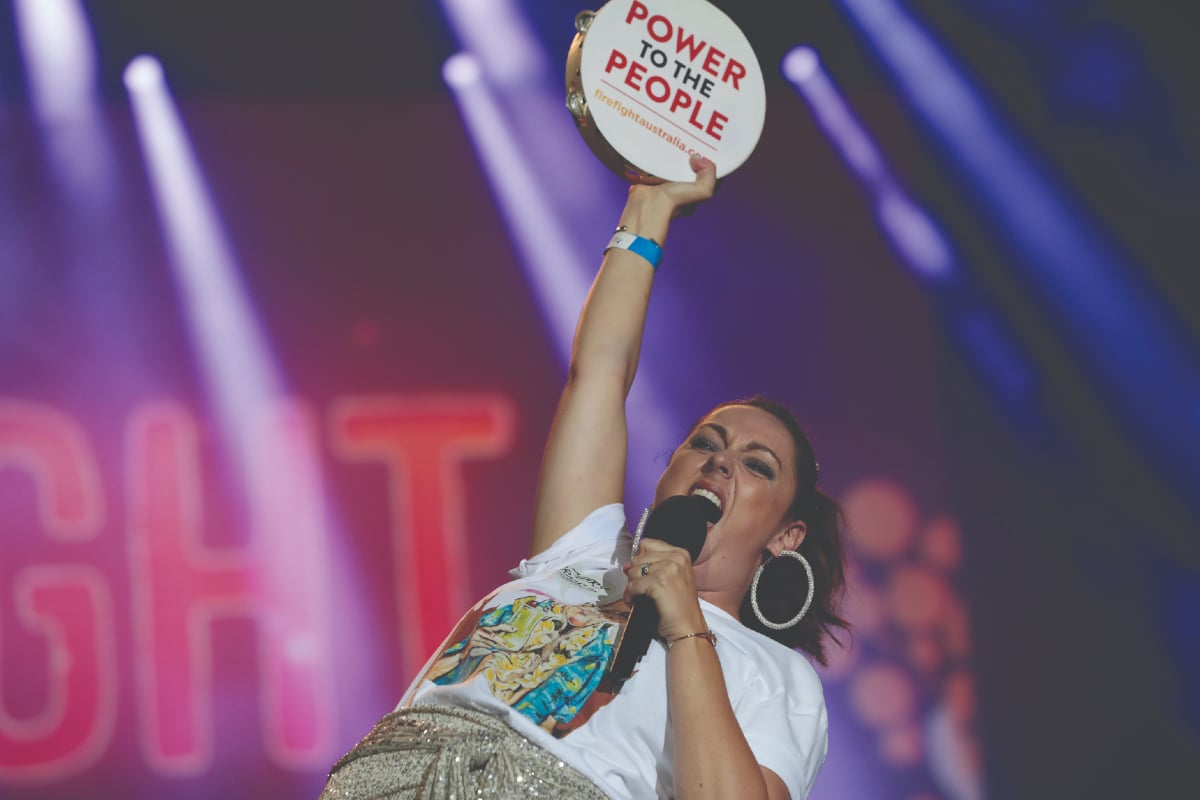
By Instagram standards, Celeste Barber’s 7.5 million followers is barely a blip (Cristiano Ronaldo tops the list with 253 million), but as is often the case, it’s quality, not quantity, that sets this Australian larrikin apart. Her parodies of the rich and famous are scathingly funny, but good natured, and often poke as much fun at herself as her celebrity targets.
Her everywoman appeal, and numerous high-profile fans (fashion designer Tom Ford adores her), goes a long way to explaining why her Australian bushfire fundraising campaign managed to surpass its original A$30,000 goal to reach a miraculous A$51.3 million. She might seem like an unlikely ambassador during a time of great tragedy, but as the saying goes, “if you didn’t laugh, you’d cry” and we all wanted to laugh with Barber in 2020.
Most notable achievement: Despite the controversy on how the money could be distributed, Barber’s fundraising appeal for bushfire relief was the largest charity drive in Facebook’s history.
The Courageous Campaigner: Antoinette Braybrook
CEO of Djirra (2002 –)
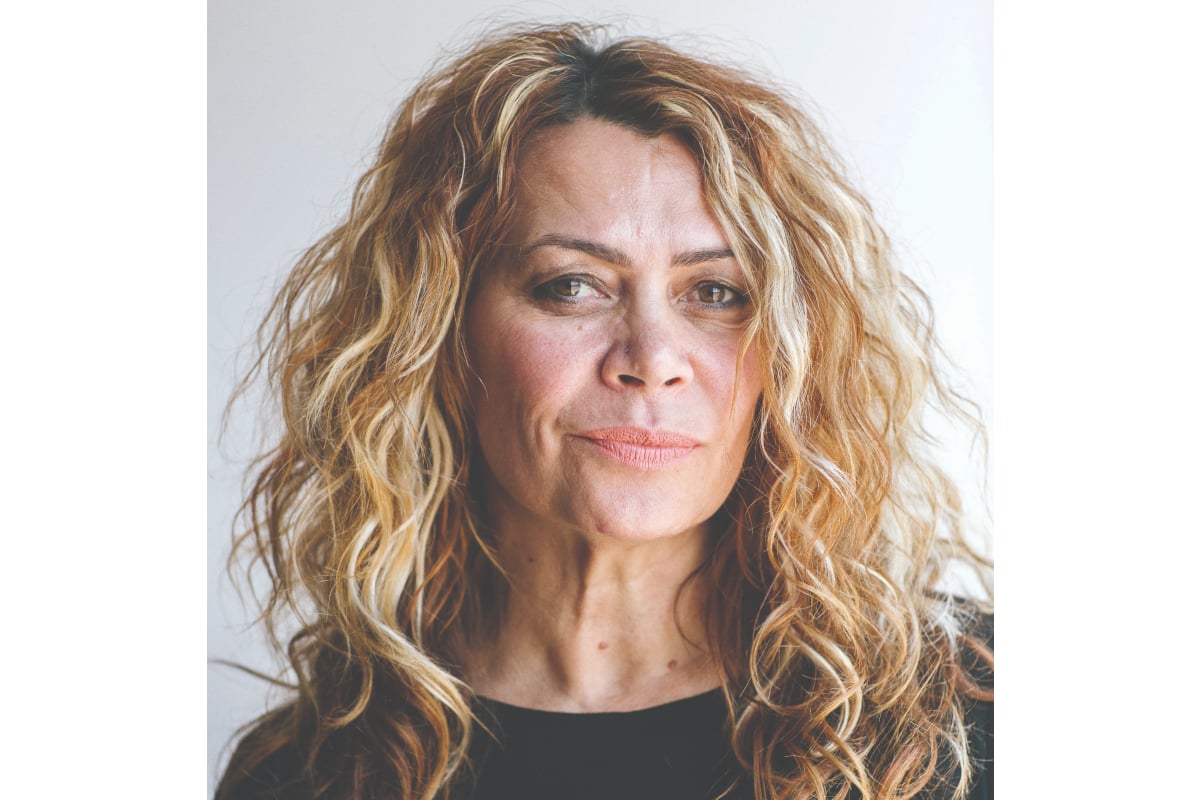
Antoinette Braybrook doesn’t back down from a fight, and for 18 years she has been fighting for Aboriginal women and children to receive the support they need. Despite continual funding cuts, dismissive governments and a disengaged Australian public, Braybrook has been an insistent and loud champion for her people as CEO of Djirra (formerly the Aboriginal Family Violence Prevention & Legal Service – FVPLS Victoria).
Djirra is an Aboriginal Community Controlled Organisation that provides culturally safe and specialist legal and non-legal support to Aboriginal and Torres Strait Islander people who experience family violence. In Australia, Aboriginal and Torres Strait Islander women are 32 times more likely to be hospitalised for family violence and 10 times more likely to die from a violent assault than non-Indigenous women. In 2020, Antoinette was inducted into the Victorian Honour Roll of Women, but awards and recognition are not what motivate the CEO. “I am inspired by my mother to live boldly and courageously. As Aboriginal women we are strong and will never give up,” she told Ella Bache in July.
Most notable achievement: Growing Djirra from a one-staff member operation to a state-wide service with more than 70 employees in seven offices across Victoria.
The Changemaker: Shani Dhanda
Disability Rights Advocate and LinkedIn Changemaker

“The way in which I view disability is that my condition doesn’t disable me; I’m only disabled when I experience barriers or bias,” Shani Dhanda told British Vogue in August last year. This statement is typical of Dhanda, who at 3ft 10in defies expectations, and challenges people to think differently, wherever she goes.
Born with a genetic bone disorder, commonly known as ‘brittle bones disease’, Dhanda had broken her legs six times by the time she was 14. But her mother never treated her any different than her siblings, and Dhanda learned not to ask for help, but demand change.
She has worked for Virgin Media for three years as a diversity and inclusion specialist, is founder of the Asian Disability Network and Asian Women Festival, and was named on BBC‘s 100 Women List 2020. With remote work more acceptable than ever, the opportunities for the disabled community are growing, and Dhanda’s ambitions remain incredibly high in 2021 – expect to see more transformative initiatives soon.
Most notable achievement: In 2019, Dhanda launched the Diversability Card, the UK’s first official discount card for disabled people, aimed at reducing financial pressures for disabled people and their families who can incur extra living costs of up to GBP $583 per month.
The Pioneer: Kamala Harris
Vice President of the United States of America (2021 –)

Kamala Harris is often defined by being the first. When she was inaugurated as Vice President of the United States in January, she became the first woman and the first person of colour to hold the second-highest office in, arguably, the most powerful country in the world. In 2016 she was the first South Asian American ever elected to the Senate, and the second Black woman, and in 2010 she was the first woman, and first Black person, elected as Attorney General of California.
Harris’ continual shattering of glass ceilings has not been without controversy – her record of being ‘tough on crime’ during her tenure as district attorney and then AG has often been criticised for supporting a corrupt and unequal justice system – but there is no denying her ambition, intelligence and tenacity has helped her forge a momentous path.
Harris told CNN that her mother used to say, “Kamala, you may be the first to do many things, but make sure you’re not the last,” and with four years until the next presidential election, Harris may still have one more ‘first’ up her sleeve.
Most notable achievement: In 2011, when AG of California, Harris won a US$25 billion settlement for California homeowners hit by the foreclosure crisis, when she famously walked away from negotiations with the big banks until her conditions were met.
The Quiet Defender: Her Excellency Tsai Ing-Wen
President of Taiwan (2016 –)
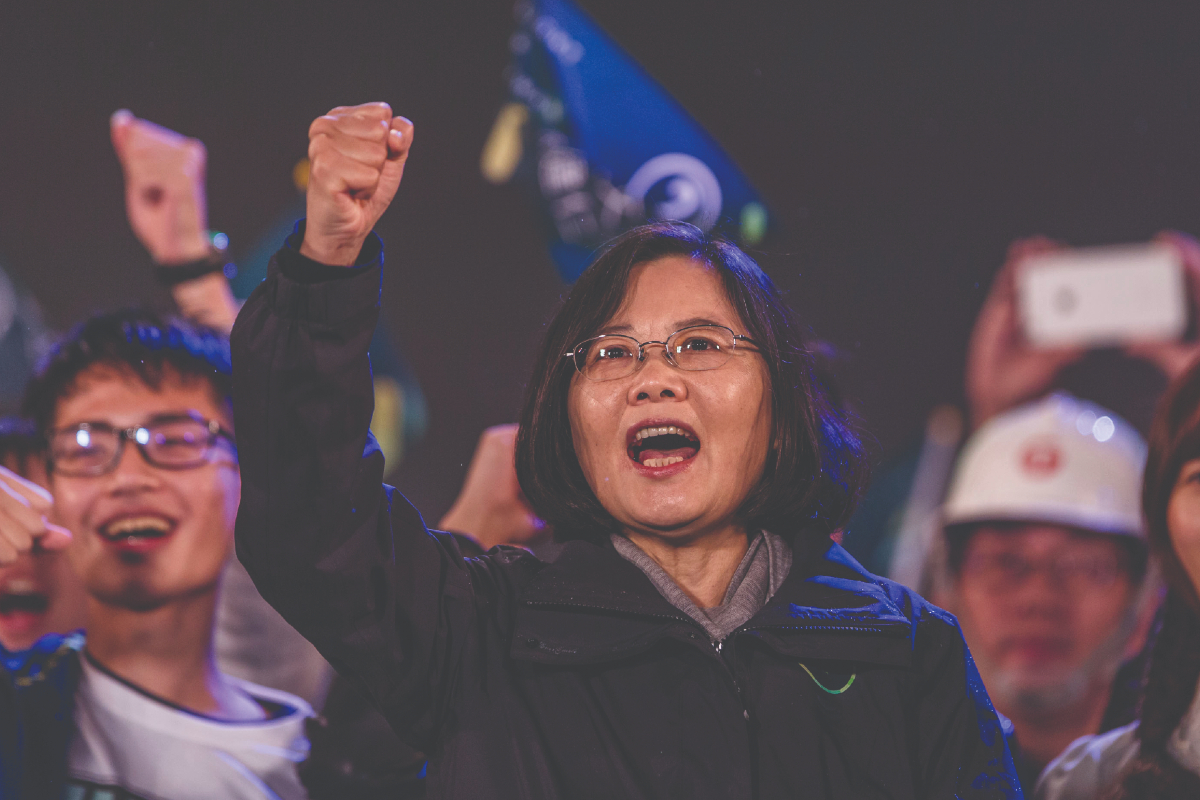
Tsai Ing-Wen, the first female president of Taiwan, is a well-known admirer of Margaret Thatcher, but it’s hard to imagine the ‘Iron Lady’ regularly posting photos of her cuddling her two cats on Instagram as Tsai does. But Tsai continues to defy all expectations of what a single (she is Taiwan’s first unmarried President), female leader in Asia should be.
With a PhD in trade law from the London School of Economics, Tsai is a respected thinker and negotiator, who won re-election in 2020 with more than 57 per cent of the popular vote. As the only Asian woman to lead a nation without being related to a former male political figure or head of state, Tsai has forged her own path, making her one of the most inspiring women in leadership. She remains popular with young people for legalising same-sex marriage in 2019, but it’s her steadfast defence of Taiwan’s independence in the face of continual pressure from China that has made her a hero to her people.
Most notable achievement: In December 2020, under Tsai’s leadership, Taiwan had gone more than 200 days without a locally acquired COVID-19 case, and the country had only 600 cases and seven deaths since the start of the pandemic.
The Fighter: Gülsüm Kav
Doctor and Co-Founder of We Will Stop Femicide Platform

Femicide is defined as ‘the intentional killing of a woman or girl, in particular by a man, on account of her gender’. Working as a family doctor in Istanbul, Gülsüm Kav saw first-hand how Turkish women hid the violence they experienced at the hands of men for fear of retribution or death, and she knew she had to work to prevent violence, not just treat it after the fact.
In 2010, Kav, along with other activists, created the We Will Stop Feminists Platform (KCDP) to monitor trials (laws against femicide are often not implemented in Turkey and men are given reduced sentences), create resources for survivors of violence, and maintain a database of women who have been murdered. Demand for support has grown significantly throughout the pandemic, but Kav fights on, even as the Turkish government discusses removing protections for victims and their families. While women keep being murdered, she has no other choice.
Most notable achievement: Helping to lead the ongoing protest movement in 2020 that, so far, has stopped the conservative Turkish government from withdrawing from the Istanbul Convention, a European treaty that aims to prevent violence against women.
Fierce Fashionista: Aurora James
Founder of Brother Vellies and the 15 Percent Pledge
For Aurora James, community has always been at the heart of Brother Vellies, the African artisanal shoe and handbag line she launched in New York in 2013. The ethical and sustainable luxury brand has workshops in South Africa, Ethiopia, Kenya and Morocco, providing jobs for hundreds of traditional handicraft makers.
But when George Floyd was murdered in May 2020, James felt a profound sense of disappointment in another community she loved. “I saw all these people and companies saying how they stood with me and supported Black Lives Matter. I was reading it but not feeling it – there was an emotional disconnection,” she told Vogue US in September when she was one of four people to grace the cover of their HOPE issue.
James wanted real-world action from the beauty and fashion community. She launched the 15 Percent Pledge in June, asking retailers to dedicate 15 per cent of their shelf space to Black-owned brands (Black people represent roughly 15 per cent of the US population). By December, large retailers like Macy’s, Sephora USA, and West Elm had signed the pledge, and more are talking to James every day – a hopeful sign in difficult times.
Most notable achievement: Getting Macy’s, the leading department store in the US with retail sales of US$24.44 billion in 2019, to sign on to the 15 Percent Pledge.
The Compassionate Capitalist: Dr. Kiran Mazumdar-Shaw
Chair and Managing Director of Biocon Ltd. (1978 –)
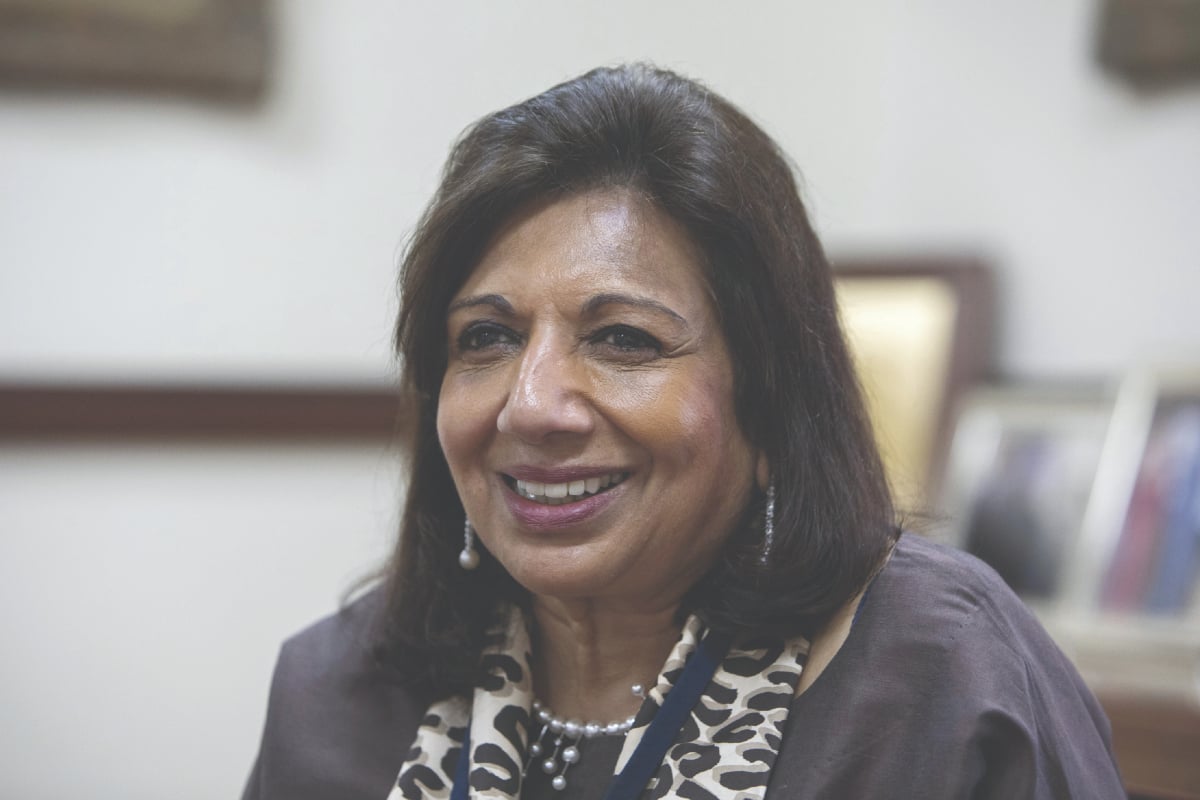
India’s richest self-made woman and first female brewmaster, Dr. Kiran Mazumdar-Shaw has a lot to thank the humble ale for – her study of brewing beer and the fermentation sciences (on the advice of her brewmaster father) has led to some of her biotechnology company’s greatest discoveries.
Mazumdar-Shaw’s driving force is what she describes as ‘affordable innovation’ – she believes in universal access to all life-saving medicines. Biocon – the company she founded in 1978 – is Asia’s largest insulin producer and has supplied more than two billion affordable doses of biosimilar insulins to patients globally. Despite often putting patients before profits, Biocon revenues were US$800 million for FY19. Not that Mazumdar-Shaw plans to keep very much of her own income – in 2016 she signed The Giving Pledge, committing 75 per cent of her wealth to philanthropy.
In 2020, the trailblazer was awarded EY’s World Entrepreneur of the Year title, and was named on Forbes‘ 100 Most Powerful Women 2020 list.
Most notable achievement: In 2014, Biocon was India’s first biotech company to go public and only the second Indian company to pass the US$1 billion mark on its first day of listing.
‘Trouble Woman’: Ngozi Okonjo-Iweala
Global Economist
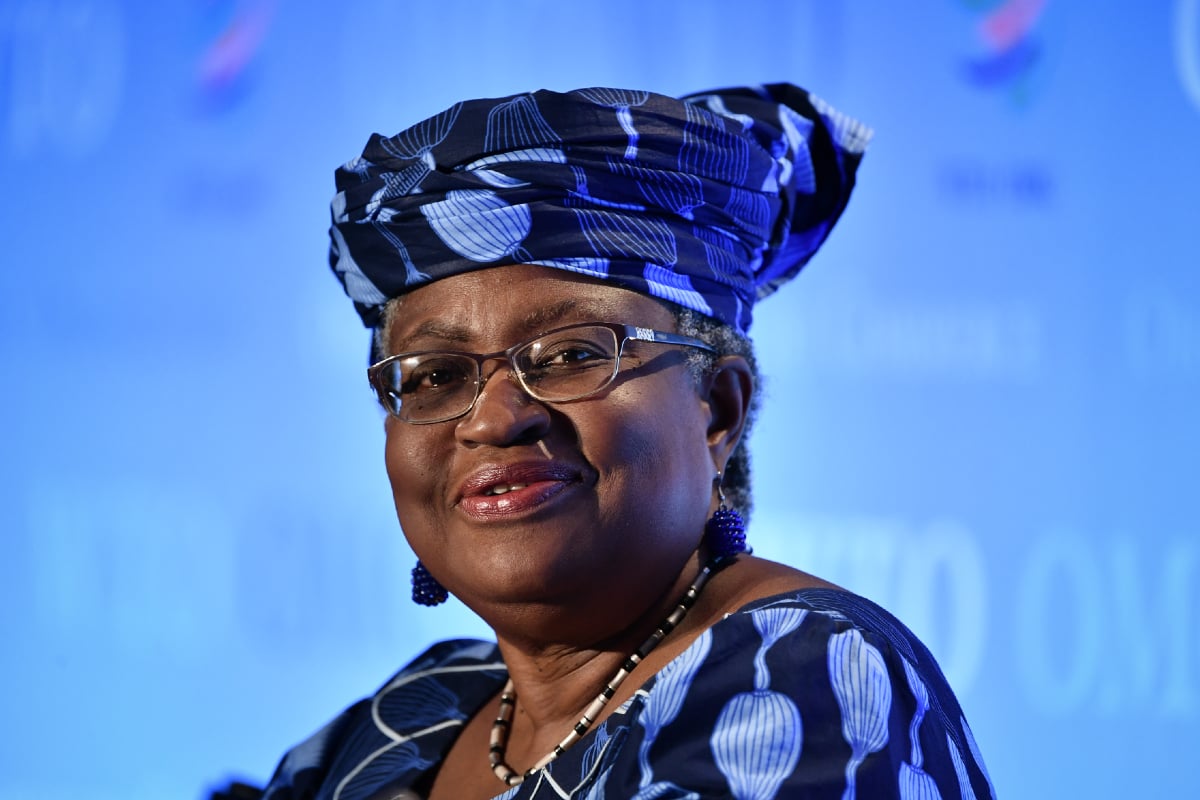
“Investing in women is smart economics, and investing in girls, catching them upstream, is even smarter economics,” said Nigerian Ngozi Okonjo-Iweala, who has recently taken the role of Director-General of the World Trade Organization (WTO). Her appointment was blocked by the Trump Administration, but she is now the first woman and the first African to lead the WTO.
If anyone knows what makes good financial sense, it’s Okonjo-Iweala. She has economics degrees from Harvard University and Massachusetts Institute of Technology, and she has served as Nigeria’s Minister of Finance twice, both times waging campaigns on corruption and cronyism that was costing her people US$15 billion and saw her dubbed ‘Trouble Woman’.
She spent 25 years working at The World Bank, rising to the number two position of Managing Director, and she sits on dozens of global boards, including as Board Chair of Gavi, the Vaccine Alliance. She’s a workaholic, an economics rockstar, and a powerful world leader who causes just the right amount of ‘trouble’ wherever she goes.
Most notable achievement: As Nigeria’s Minister of Finance, she convinced the Paris Club of Creditors to wipe out US$30 billion of Nigeria’s debt, including the outright cancellation of US$18 billion.
The Revolutionary: Alexandria Ocasio-Cortez
US Representative for New York (2018 –)

“It’s not an accident that, every cycle, the boogeyman of the Democrats is a woman,” Alexandria Ocasio-Cortez (or AOC to her legions of fans) told Vanity Fair in October. “A couple of cycles ago, it was Pelosi. Then it was Hilary, and now it’s me.”
The fact that AOC is young, female and a person of colour is definitely an issue for many Republicans, who often dismiss her by saying “she just tweets”. But the youngest woman ever elected to Congress is, perhaps, most disliked because she is unashamedly and outspokenly herself. Since her election in 2018, AOC has not stepped back from her progressive policies and has no problem embarrassing Republicans and their allies during her masterful performances in question time.
A democratic socialist who believes in free college education, free Medicare, and that the US can, and should, achieve net-zero greenhouse gas admissions by 2030, it’s not that AOC doesn’t play the political game, it’s that she plays it entirely on her terms. She uses social media, and most recently popular online game Among Us on her Twitch platform, to engage with voters. She starts high, like with the radical Green New Deal, and not a compromised middle, and insists that other politicians meet her there. She fights hard, laughs big and dances silly, and for many she is the brightest star in America’s future.
Most notable achievement: AOC co-chaired the Climate Unity Task Force on Climate Change with Secretary John Kerry to help shape President-elect Biden’s multitrillion-dollar climate policy. The task force convinced Biden to accelerate his timetable for achieving net-zero carbon pollution from the electricity sector and to devote more money to transitioning to renewable energy.
The Athlete Activist: Naomi Osaka
World Champion Tennis Player

If you haven’t checked in on 23-year-old Naomi Osaka since she burst onto the international tennis scene in 2018 – when she beat Serena Williams in the US Open women’s singles finals and silently cried on court as she was jeered and booed for defeating one of her idols – you might not recognise the self-assured and outspoken women she’s become today.
The three-time Grand Slam champion, who represents Japan but was raised in the US, is often on TikTok and Twitter, has inspired a Manga character, and was one of five recipients for Sports Illustrated’s Sportsperson of the Year 2020 award, primarily for her decision to take a stand against racial injustice in the past year.
At the US Open, Osaka wore seven different face masks – each emblazoned with the name of a US victim of police brutality. By using her global platform for social activism in such a highly visible way, it’s clear Osaka has found her voice, and she’s only just getting started.
Most notable achievement: In 2020, Osaka became the highest-paid female athlete in history, making an incredible US$37.4 million in just 12 months.
The King Slayer: Nancy Pelosi
52nd Speaker of the US House of Representatives (2019 –)

Nancy Pelosi entered formal politics relatively late in life, only being elected to the House of Representatives in 1987 at the age of 47. But, in the intervening years, the first female Democratic leader of the House of Representatives has definitely made up for lost time, passing landmark legislation and rising to the highest position in her party.
In 2019 Pelosi started her third term as Speaker of the House and the role made her the highest-ranking elected woman in the country, and the second-in-line for the presidency. Immediately, Pelosi made her role clear – she was there to keep President Trump in check and to meet his outlandish behaviour with wit, intelligence and a hell of a lot of gumption.
In the same year, she initiated impeachment proceedings against President Trump, and despite the House successfully charging him with abuse of power and obstruction of Congress, he was ultimately acquitted by the Republican-controlled Senate. While not an all-out victory, Pelosi stood up to a bully and won, and with the Biden Administration moving into the White House, this grandmother of five won’t be slowing down any time soon.
Most notable achievement: Pelosi ‘shepherded through’ the Affordable Care Act, also known as Obamacare, when other Democrats had written it off as impossible.
The Hero: Özlem Türeci
Chief Medical Officer of BioNTech (2008 –)
A year ago, Özlem Türeci and her husband Ugur Sahin were trying to cure cancer at their German company, BioNTech. Twelve months later, the story of how the couple pivoted 600 of their employees to work on a COVID-19 vaccine two months before the World Health Organization had even declared a pandemic is already legend, and 1.3 billion doses of the vaccine they developed with US pharmaceutical giant Pfizer are to be produced in 2021.
Both scientists were billionaires even before the vaccine, having sold their first biotech company, Ganymed (meaning ‘earned through hard work’ in Turkish) for US$1.4 billion in 2016. But the couple, both children of Turkish migrants, still ride their bikes to work every day from their modest apartment in the small German town of Mainz, where they are raising their teenage daughter. They celebrated the news that the COVID-19 vaccine was 95 per cent effective with a cup of tea.
Türeci said she and her husband had a ‘moral imperative’ to find a vaccine for coronavirus. Despite their company now being valued at US$21.9 billion, and with Nobel Prizes no doubt still to come, one thing is certain – Türeci will still be riding her bike to work and the entire world owes her its thanks.
Most notable achievement: Developing a vaccine that is 95 per cent effective in 11 months – the previous record for a modern vaccine was four years, achieved in the 1960s for mumps.
The Girl Who Could: Joey Wat
CEO of Yum China (March 2018 – )
Becoming the CEO of a Fortune 500 company is an easier path for some than others. But, for a nine-year-old girl working in a plastic flower factory in a small village in China, it should have been impossible. And yet, that girl, Joey Wat, is now CEO of the largest restaurant company in China, operating over 10,000 restaurants, including Pizza Huts and KFCs, in 1,400 cities across the country.
Wat’s humble upbringing has defined every move she has made. Despite the possible hit to her reputation, she took on the job of Managing Director of the struggling UK beauty chain, Savers, in 2007 because she knew thousands of people would lose their jobs if she didn’t turn the company around. And when the pandemic hit, Wat had Yum China deliver free meals to more than 1,450 hospitals and community centres to help keep as many of her 400,000 staff employed as possible. Wat always puts her employees first knowing that profits will follow – Yum China still managed to make an operating profit of US$97 million in the March 2020 quarter.
Most notable achievement: Before Wat’s tenure, Yum China profits were declining, in large part because of a minimal digital presence. Wat has grown digital payments to 97 per cent of the business and 285 million members are now using its mobile app.
Corporate Climate Change Warrior: Shemara Wikramanayake
CEO of Macquarie Group (Dec 2018 – )
Not many men are asked or expected to explain how they became a successful CEO while raising their children. But Macquarie Group CEO, Shemara Wikramanayake, the first woman to become Australia’s highest paid CEO with a salary of A$18 million, is frequently vocal about how her husband’s choice to be a stay-at-home father to their two sons has played a large role in her success.
Her children’s future is definitely at the forefront of her business thinking these days. After working 15 different jobs in six countries for Macquarie Group since 1987, Wikramanayake became the first Asian-Australian woman to head an ASX 200 listed company in 2018. Wikramanayake has steered the company towards climate-resilient investments, is a member of the United Nation’s Climate Finance Leadership Initiative, and she also advises the Australian government on green technology investment.
The CEO has said she’s looking to make changes for women at Macquarie by increasing flexible work arrangements and easing the cost of childcare.
Most notable achievement: As one of only three CEOs named to the World Bank’s Global Commission on Adaptation, she led efforts to raise AU$1 billion for renewables investment.

